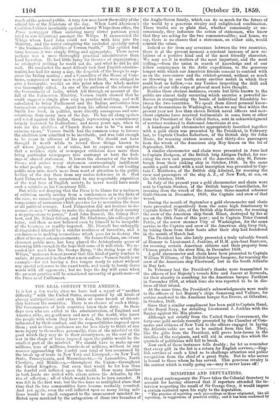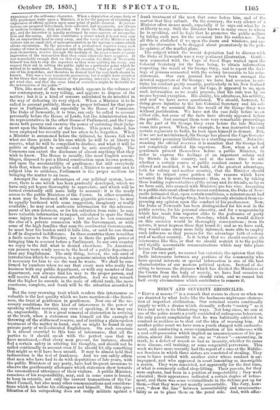MINISTERS AND DEPUTATIONS.
Gan great contemporary the Times takes the Colonial Secretary to account for having observed that if reporters attended the in- terview respecting the recall of Sir George Grey, it would impose a certain restraint upon his reply to the deputation.
"The practice of reporting such proceedings as these originated, like all reporting, in suggestions of practical utility, and it has been confirmed by
experience of the self-same character. When a deputation of sonic forty or fifty gentlemen waits upon a Minister, it is for the purpose of obtaining an expression of official opinion upon some point of public interest. Represen- tations are prepared beforehand, facts collected, and arguments, not always of uniform tendency, duly provided. To these the Minister makes his re- ply, and the interview is usually prolonged by some amount of interpella- tion and discussion. All this constitutes a result which it is not very easy for an unpractised head to carry away, and the words of the Minister or his visitors run no small risk of misrepresentation in the various versions which obtain circulation. By the presence of a professional reporter every such chance of error is removed, and not only the public, but perhaps the spokes- men themselves, receive through the medium of the press a more accurate impression of the transaction than they could otherwise have acquired. It was remarkable enough that on this very occasion the Duke of Newcastle himself was fain to stop the reporters as they were quitting the room, and request their aid in setting the public right on a particular point which he wished to be understood. Something, he observed, "had got wind" about one of his despatches, and therefore he desired that the real truth should be known. This was a very reasonable precaution, but it might have occurred to his Grace that some particulars of the pending interview were likely to get wind also, and that the same kind of corrective might be desirable for the information of the public."
This, like most of the writing which appears in the columns of our contemporary, is very telling, and appears to dispose of the matter ; but it is a kind of censure calculated to do mischief in the way of defeating its very object. When a Minister is to be called to account publicly, there is a proper tribunal for that pur- pose in Parliament, and especially in the House of Commons. The Duke of Newcastle, it is true, can only be called to account personally before the House of Lords, but the Administration has its representatives in the other House of Parliament, and the Com- mons both possess and exercise the power of enforcing their judg- ment upon the Ministers of the Crown. This power, indeed, has been employed too recently and too often to be forgotten. When a Minister is summoned before the tribunal, he knows full well what are those points in his case which he will be at liberty to reserve, what he will be compelled to disclose, and what it will be politic or dignified to unfold--and he acts accordingly. The Commons can extort the disclosure of almost anything that they wish to know. The House is usually, like most English assem- blages, disposed to put a liberal construction upon its own powers, and upon the accountability of gentlemen ; but still everybody feels that, where the public is to call a Minister to account and to subject him to criticism, Parliament is the proper medium for bringing the matter to an issue.
Amongst the many advantages of our political system, how- ever, there is one which has been gradually developed, which we have only yet begun thoroughly to appreciate, and which will be turned eventually still more fully to account : it is the ready access to the public Ministers of the Crown. In other countries, a man may be burdened with some gigantic grievance ; he may be equally burdened with some suggestion, imaginary or really available ; he may need authentic information for the advance- ment of his own interests, or for his salvation from ruin; he may have valuable information to impart, calculated to spare the State some injury in finance or repute ; but unless he can command the clue of a private connexion with the Government, or with some of the high families that man the continental Governments, he must bear his burden until it kills him, or until he can throw it off in disgusted indifference. In those countries there is neither a facile access to the Minister, nor is there the public power of bringing him to account before a Parliament. In our own country we enjoy to the full what is denied elsewhere. No American can possess more ready access to the head of a public department than any Englishman. The only thing, indeed, the sole card of introduction which he requires, is a genuine mission which renders it necessary for him to see the man he wants. We shall be con- firmed by numbers when we say that every man who really has business with any public department, or with any member of that department, can always find his way to the proper person, and will receive full and courteous attention. And we may remark that the higher he ascends in the scale of official rank, the more courteous, complete, and frank will be the attention accorded to him.
But the very crowning trait which renders this intercourse so valuable is the last quality which we have mentioned—the frank- ness, the trust of gentlemen in gentlemen. Now one of the ne- cessary conditions for this kind of intercourse is the power of speaking without restraint, nay even of speaking, if we may say so, unguardedly. It is a great removal of obstruction in arriving at the truth, when a statesman can himself set the example of throwing off the stiffness of reserve, and of inviting a plain-spoken treatment of the matter in hand, such as might be found in any private party of well-educated Englishmen. On such occasions it is almost essential to this tone of intercourse, that all the parties to it should speak with the perfect ease that we have mentioned,—tbat every. man present, for instance, should
feel a certain safety in uttering his thoughts, and should not be called continually to account even if he should let slip something that might as well have been unsaid. It may be almost held that indiscretion is the test of frankness. And we can safely affirm that men who have had to do with deputations of late years, with the public Ministers of any party, have had frequent occasions to observe the gentlemanly allowance which statesmen show towards the unconsidered utterances of their visitors. A public Minister, conscious of his responsibility, may, and in some cases is bound, to keep in retentis, not only the current transactions of the Ca- binet Council, but also many other communications and considera- tions which are before his colleagues and himself. But this qua- lification of his outspeaking does not really militate against a frank treatment of the men that conic before him, and of the matter that they submit. On the contrary, the very silence of a Minister often means much, especially if he says out what he is at liberty to say. Still the Minister knows in many cases to whom he is speaking, and he feels that he promotes the public welfare by taking such men for the occasion into his confidence. Now all this is abolished if we open the doors and windows, and ex- pose the discussion to be dragged about prematurely in the pub- lic opinion of the market place.
The subject which the recent deputation had to discuss with the Duke of Newcastle was a very pertinent illustration. Genth!- men connected with the Cape of Good Hope waited upon the Colonial Secretary for the time being, to obtain information respecting the recall of Sir George Grey, and to report the feel- ings of persons connected with the colony favourable to his rein- statement. Our own journal has never been amongst the devoted supporters of Sir George; we have had occasion to cri- ticize his conduct pretty smartly, particularly in his New Zealand administration ; and even at the Cape, it appeared to us, upon such information as we could procure, that his rule was by no means beyond exception. His ability, his adroitness, his activity, and zeal we have never questioned. We should, however, be doing gross injustice to the late Colonial Secretary and his col- leagues, if we assumed that the recall of Sir George Grey was without justification. We have not the case fully before us on either side, but some of the facts have already appeared before the public. And amongst them were very remarkable proceedings on the part of Sir George Grey even before the late Ministry came into power. When, for example, he was instructed to send certain regiments to India, he took upon himself to demur. But, if we are not misinformed, Sir George has placed the Cape Govern- ment under pecuniary liabilities to a startling amount. Notwith- standing the official reserves it is manifest that Sir George had not completely satisfied his superiors. Now, when a set of gentlemen present themselves before a public Minister, in order to express the feelings of an important colony and its friends in this country, and at the same time to ask whether a certain course of public conduct cannot be recon- sidered and modified, it is, we hold, of the greatest advantage, both for colony and mother country, that the Minister should be able to impart some portion of the reasons which have actuated the Imperial Government ; thus, as it were, by taking these leading representatives of the colony and its friends, so far as we have said, into council with Ministers pro has vice. According to a public statement about the recent conference, the Duke of New- castle intimated that, upon certain conditions, a reinstatement had been offered to Sir George Grey, but he expressly abstained from ex- pressing any opinion upon the conduct of his predecessor. Now, the Duke of Newcastle has been distinguished for his zeal in the public service, for his personal sincerity, and for a magnanimity which has made him superior alike to the jealousies of party and of rivalry. The answer, therefore, which he would deliver on this occasion would be thoroughly conscientious ; from its nature, it must impress those that heard it ; and as we have said, they would come away more fully informed, more able to employ such influence as they possess for the advantage both of colony and of mother country. Is it better that we should continue an intercourse like this, or that we should restrict it to the public and rigidly accountable communications which may take place before Parliament?
For our own part, we cannot but entertain the opinion that this facile intercourse between any portions of the community who have special interests or special information is one of the best characteristics of our modern political system. Instead of de- siring to increase the distance which has divided the Ministers of the Crown from the body of society, we have had occasion to lament that any such distance should exist, and we cannot but hail every circumstance which contributes to remove it.



























 Previous page
Previous page